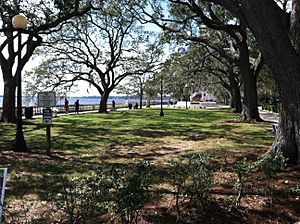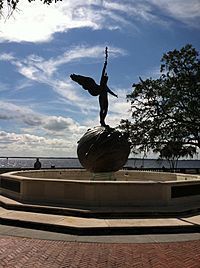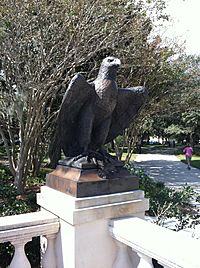Memorial Park (Jacksonville) facts for kids
Quick facts for kids Memorial Park |
|
|---|---|
 |
|
| Type | Municipal (Parks & Recreation Department) |
| Location | Jacksonville, Florida |
| Area | 5.85 acres (2.37 ha) |
| Created | 1919 |
| Designer | Olmsted Brothers |
| Operated by | City of Jacksonville |
| Status | Open all year |
|
Memorial Park
|
|
| NRHP reference No. | 100001389 |
| Added to NRHP | October 25, 2017 |
Memorial Park is a 5.85-acre (23,700 m2) public park, located on the St. Johns River in Riverside, one of the most historic neighborhoods near downtown Jacksonville, Florida. It is the third-oldest park in the city, and was listed on the National Register of Historic Places in 2017.
History
Memorial Park is situated on the north bank of the St. Johns River, bounded by Riverside Avenue. Shortly after World War I ended, the Rotary Club of Jacksonville suggested building a park in honor of the 1,200 Floridians who died in the conflict, and the following year, the City acquired the land.
The park project was embraced by Jacksonville residents, and 31 civic groups were involved in raising money and planning. The Olmsted Brothers were commissioned to design the park. The firm also laid out the Biltmore Estate, several National Parks and numerous college campuses. They worked with local architect, Roy A. Benjamin.
The bronze sculpture, "Life" is showcased, and was created by Charles Adrian Pillars, a First Coast resident for over a quarter century. Pillars was also responsible for the two works of art from Florida at the National Statuary Hall in Washington, D.C.. The park, completed in 1924 and dedicated on Christmas Day, became Riverside's most popular location.
The Memorial Park Association (MPA) was founded in 1986 by Anne Freeman, and has worked to preserve the park for over a quarter century. High winds uprooted and toppled many trees in 1997, but city employees and MPA volunteers worked together to restore the park. Two 48" tall eagles, each sculpted in bronze, were donated by the MPA and dedicated on May 29, 2011. Their design was based on photographs of concrete statues originally installed when the park was opened. The artist was local sculptor, Diane LaFond Insetta. On September 11, 2017, Hurricane Irma flooded the park and destroyed the balustrade along the seawall. As of 2020, it has yet to be fixed.
Current use
Despite the loss of many trees in 1997, the area along the riverfront still provides welcome shade for people, fishing, jogging, pushing a stroller, or just sitting on a bench and reading.



